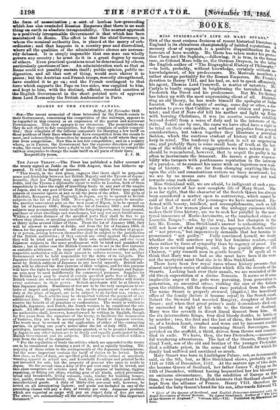THE JAPAN TRBATY.—The Times has published a fuller account of
-the treaty signed at Jeddo on the 26th August, than has hitherto ap- peared. It will be found of interest. This treaty, in the first place, engages that there shall be perpetual peace and friendship between her British Majesty and the Tycoon of Japan ; secondly, that her Majesty may appoint a diplomatic agent to reside at Jeddo, and the Tycoon a diplomatic agent to reside in London, both of them respectively to have the right of travelling freely to any part of the empire of Japan, and to any part of Great Britain; also either Power may appoint oonsuls or consular agents at any or all the ports of the other. The ports of Hakodadi, Kanagawa, and Nagasaki, in Japan, are to be opened to .British subjects on the 1st of July 1859. Nee-e-gata or if Nee-e-gata be unsuita- ble another convenient port on the west coast of Nipon, is to be opened on the 1st of January 1860; Hiogo on the 1st of January 1863; and British subjects may permanently reside in all the foregoing ports, may lease ground, purchase or erect dwellings and warehouses, but may not erect fortifiratMns. Within a certain distance of the specified ports they shall be free to go where they please, or speaking generally, they have a tether of some twenty 4H thirty miles around either of them. From the let of January 1862, they will be allowed to reside at Jeddo and from the let of January 1863, at Oseca for the purposes of trade. All questions of rights, whether of proper- ty or person arising between themselves shall be subject to the jurisdiction a the British authorities ; if they commit any crime against the Japanese they will be tried and punished by their own authonties, and vice verses Japanese subjects in the same predicament will be tried and punished by theirs • but in either case the British Consuls are to act in the first instance as amicable arbitrators. In respect of debts contracted on either side, the respective authorities will do their utmost to enforce recovery, but neither Government will be held responsible for the debts of its subjects. The Japanese Government will place no restrictions whatever upon the employ- ment by British subjects of Japanese in any lawful capacity. British sub- jects will be allowed the free exercise of their religion, and for this purpose will have the right to erect suitable places of worship. Foreign and Japan- ese coin may be used indifferently for commercial purposes. Supplies for the British navy may be stored at certain specified ports free of duty. If British vessels are wrecked or stranded the Japanese authorities will render every assistance in their power. British merchants will be at liberty to hire Japanese pilots. Munitions of war are to be the only exceptions to ar- ticles of import and export, which last, on the payment of an ad valorem duty at the place of import, are to be subject to no further tax, excise, or transit duty. Such articles may be riexported without the payment of any additional duty. The Japanese are to prevent fraud or smuggling, and to receive the benefit of all penalties or confiscations. The treaty is written in English, Japanese' and Dutch, the Dutch version to be considered the ori- ginal. All official communications on the part of the British to the Japan- ese authorities shall, however, henceforward be written in English, though for five years from the signature of the treaty, to facilitate the transaction of business, they are to be accompanied by a Dutch or Japanese version. The treaty may be revised on the application of either of the contracting -parties, on giving one year's notice after the 1st of July 1872. All the 'igriviteges, immunities, and advantages granted, or to be granted hereafter, Jiy Japan to any other nation are te be freely and equally participated by the British Government and its subjects. The treaty is to be ratified within a 'year from the day of its signature. "For the regulation of trade the articles which are appended to the treaty are to be considered as forming a part of it, and as equally binding. The majority of these relate to the arrangements of the Japanese Customhouse, but the more important contain the tariff of duties to be levied. In the :first class, as free of duty, are specified gold and silver, coined or uncoined, 'Wearing apparel in actual use, and household furniture and printed books 'not intended for sale, but the property of persons who come to reside in Japan. On the second class a duty of five per cent only will be levied, and this class comprises all articles used for the purpose of building, rigging repairing, or fitting out ships, whaling gear of all kinds, salted provisions, bread and breadstuffs, living animals coals, timber for building houses, rice, paddy, steam machinery, zinc, lead, tin, raw ailk, cotton and woollen manufactured goods. A duty of thirty-five per-cent will, however, be levied on an intoxicating liquors; and goods not included in any of the preceding classes will pay a duty of twenty per cent. Japanese products which are exported as cargo will pay an export duty of five per oent. The above are substantially all the material stipulations of thin important document."


























 Previous page
Previous page